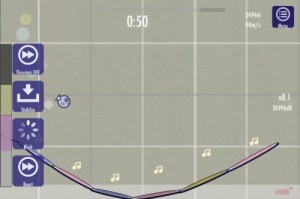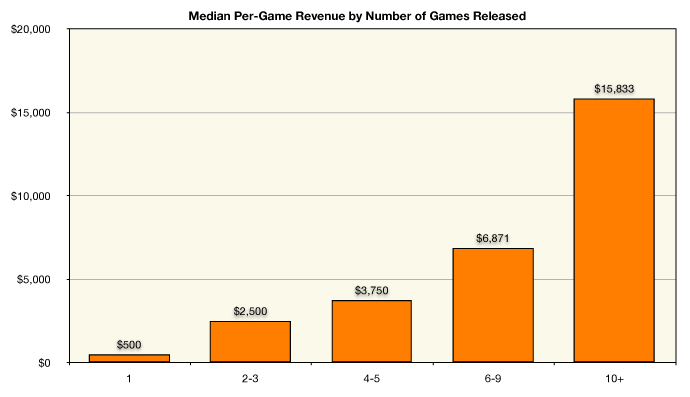
The main reason to write this post is to get a snapshot of what has helped, and what I am struggling with as a result of my decision to do iOS game dev as opposed to joining a company.
There are many posts out there on success, but very few post mortems and even fewer midway blogs that have the same level of detail. I am so greatful to those posts because helped me get a grasp on what I would be dealing with, which is a lot more than I expected.
0. Money
If you’re going to do iOS dev there’s no reason you can’t just start on top of your existing job during your downtime, provided you can commit 10-20 hours a week. However if you’re going all in you’re going to need some cash to burn. Some people get funding through loans, family/friends, or VC firms, but these were all to scary for me. Using your hard earned money to live on while you develop apps is also pretty scary, but it has the advantage of feeling like you are still in control. Fortunately, after you have the hardware there isn’t too much costs besides your basic living cost if you plan to work from home. In the states if you budget right and know how to cook you can probably live on $12 – 20,000/yr depending on how you do it. In Japan I’m on par for the upper range of that. I’ve found it important for once having decided your budget, to figure out your wiggle room and not be overly stingy. Remember that sometimes it is also necessary to treat yo self. Also to note – I’m doing most things myself which really helps keep costs to a minimum, but I have a budget for art/design as well.
1. Finding a place to call SOHO
Despite being a largely unsocial person, I am still greatly affected by my social environment. Both consciously and subconsciously, I try blend in and soak up the surrounding culture. On the outside my appearance varies by location as well. I wore T-shirts and shorts in Hawaii, acid-washed jeans with hoodies in Seattle, and blazers with striped pants in Tokyo. This isn’t so much about fashion as it is an external social effect. I used to see this as ‘fitting in’ but lately I’ve come to see this phenomenon in a more positive light, as a sort of respect for the locale. Internally, something similar happens. This is the reason I can work harder in Tokyo than I can in Hawaii. Japan in general, but Tokyo specifically, radiates of work and a focus on quality. On the bad end this could mean 80 hour work weeks and a certain stiffness. On the good side, this means being dedicated to the task and making it happen. For example, I was inspired last month when a company took a building garage in my neighborhood and turned it into a fully decked out shiny supermarket in just 2 weeks. I should be clear this effect is entirely personal and not meant to portray Berlin or Hawaii as lazy by any means – I have known great examples of people excelling there.
2. Market Data Ignorance
 I’m budgeting such that I’m giving myself several years to turn this around, but the hope always seems to be that I’ll be able to break even pretty soon, but this is just residual newbie iOS dev folly lying around. About half a year ago there was a huge rush of media about the iOS market being a lottery, and that the gold rush was over. The later is certainly true, as you will see if you go to iphonedevsdk.com and read a bit of the forum posts about people who only sold 2 copies of their game.
I’m budgeting such that I’m giving myself several years to turn this around, but the hope always seems to be that I’ll be able to break even pretty soon, but this is just residual newbie iOS dev folly lying around. About half a year ago there was a huge rush of media about the iOS market being a lottery, and that the gold rush was over. The later is certainly true, as you will see if you go to iphonedevsdk.com and read a bit of the forum posts about people who only sold 2 copies of their game.
The bit about it being a lottery is a unfair though, as I have to believe there is a strong correlation between quality and success in the app store. The thing is that ‘quality’ does not only include polish/functionality/look-and-feel, but also all the other fine points of the market. For example, a few weeks ago an app with casual game play called Gangnam Style Massacre hit the top of the charts, even though it was unaffiliated with the artist and wasn’t very fun according to most reviewers. Yes, bad games can be a hit for external reasons, but this has nothing in common with a lottery, which implies random selection. Not that I know much about marketing, but one of the things I have seen so far is that it is about making presentation clear and relevant as possible for your target.
On the other hand well polished games can be a bust. The most famous example I know in the iOS community is Gasketball, the devs of which spent three years living like college students, borrowing money from family and friends, only to release an app that would be downloaded much but not sell enough to break even. The guys at the walled garden weekly did a great analysis of why it didn’t work in the iOS market. Actually, I should point out although the forum is a casual beer drinking chat podcast, the walled garden weekly podcast, done by the developers of Zombie Gunship and Zombie Highway, is probably the and most legit and informative resource for iOS marketing I’ve seen so far on the web. There are many other iOS podcasts out there that are also worth looking at.
Some polished games are success right of the bat. Some of these, like the developers for S.Q.U.I.D.S. write great writeups specifically for helping other indies. This is not an altruistic move of course – but indie devs are starting to realize with things like cross promotion, that we are not in the kind of kill or be killed competition, as some marketing techniques such as cross promotion have shown.
If you just want to test the water and put together a 2 day app you obviously don’t need to spend a week doing market research. But if you plan to continue it’s definitely worth spending some time on this. I regret putting this off for too long. So that this won’t be too depressing here’s some good data. Streaming Color did a survey of iOS devs that showed although the first apps released by a single developer didn’t do very good on average, the median per game rises sharply after the first few are developed. So there is at least some encouraging data that provides incentive to keep going.
3. Market Competition Ignorance

I came to iOS from doing academic experimental music and research. In most creative arts, especially the more recent ones, when you make a piece the feedback mechanism is loose. It’s not clear if what you made was good or not, and in most cases there is nothing to buy. Both popular and monetary success are not as important. I could always say that I ‘don’t care because even if no one likes it this means something to me’ or ‘people will see in the future what I meant when the world is ready’. And this is totally acceptable. I think games are also an artform that just have a much much heavier commercial side to it. This means that the feedback loop is a lot clearer, and monetary and popular success is part of it. When your game flops you know immediately because you can tell from the graph that gets updated nightly that you still have to eat cup ramen this month (or learn how to cook fast and well :).
On the other hand, being able to tell when something didn’t work is a great way of checking your assumptions about the market. You can then spend time finding out why, and change it for the next time. Fortunately the expectation of iOS apps and games is that they are smaller worlds that take less dev time then their desktop counterparts. This means that agile development techniques can be used to test the waters and get a bunch of apps out quickly to try and triangulate your best heading. I should also mention that the hierarchical nature of software means that you should be able to reuse a lot of code for these apps, which also enormously speeds up the time it takes to develop a game after the first. At least that’s the basic strategy I’m going with.
4. Pressure

For example, ironically, my lifestyle looks almost exactly like the Japanese social phenomena of the ‘neet’, ‘hikikomori’, and the ‘freeter’, which are somewhat derogatory terms for younger people who can’t or aren’t willing to work and perhaps sit around or spend all their time on games and 2ch. I program at my desk so I stay at home most of the day, occasionally going out to get cheap food, and don’t have much of a social circle. For some reason, although there are many web/graphic designers who work freelance, small software business/indie game development is much less popular in Japan than it is in the U.S., and at the scale I am doing it at it will seem like a hobby to many people rather than actual work. This gives me a certain amount of pressure. Or maybe I just need to get better at explaining what I do in Japanese.
The way to deal with this, I’ve found, is to realize that it is a valid source of stress, that I have no way to control. That might sound like despair, but somehow accepting it as just the way things are means I can avoid thinking about it and just do work instead.
If you haven’t checked it out, for those of you who managed to read to this point, you should watch the 2012 documentary Indie Game. It follows the trials and tribulations of three indie game developers that are well known. Sometimes it’s good to hear that others are going through the same mental struggles, because we grew up in a society that tells us we should be happy all the time, or there’s something wrong. This documentary reminds that sometimes there’s something right too.
5. Addictions
 I used to smoke and watch lots of TV. Now I don’t smoke and I control the amount of TV I watch. But if I’m not careful I can spend half a day googling about fixing posture or flipping between reddit and other news. There are definitely periods of time where it is easy to work all day, but sometimes the motivation just isn’t there. It’s usually related to feeling stressed about something, or not having clear direction for the next step of the development. However, no amount of planning or horse-blinds will change the fact that sometimes I try to avoid work by going to these automatic activities that I don’t even really enjoy. Find out what they are and turn them into signals for when you should take a second look at your plan – I find that making changes to the plan usually means I want to start implementing them right away. Set the amount of time you’re going to use for leisure aside, and stick to it. I try to remind myself this is only going to work if you can take it as seriously, and hopefully more seriously than the desk job. When all else fails I sometimes turn towards productivity hacks like the pomodoro technique. Usually I find once I start writing a bit of code I feel great and I don’t want to stop.
I used to smoke and watch lots of TV. Now I don’t smoke and I control the amount of TV I watch. But if I’m not careful I can spend half a day googling about fixing posture or flipping between reddit and other news. There are definitely periods of time where it is easy to work all day, but sometimes the motivation just isn’t there. It’s usually related to feeling stressed about something, or not having clear direction for the next step of the development. However, no amount of planning or horse-blinds will change the fact that sometimes I try to avoid work by going to these automatic activities that I don’t even really enjoy. Find out what they are and turn them into signals for when you should take a second look at your plan – I find that making changes to the plan usually means I want to start implementing them right away. Set the amount of time you’re going to use for leisure aside, and stick to it. I try to remind myself this is only going to work if you can take it as seriously, and hopefully more seriously than the desk job. When all else fails I sometimes turn towards productivity hacks like the pomodoro technique. Usually I find once I start writing a bit of code I feel great and I don’t want to stop.
I was going to talk more about how what kind of food I eat and other trivial stuff but somehow this turned into a confessions of an unknown newbie indie game dev and is now multiple pages long. Since I’ve been consuming more resources from the indie game dev community I want to contribute some back though, and this is really all I can think to do right now. If only for a survey of resources or even just plain commiseration, I’m glad to write this kind of blog. I guess I’ll save the cheapo indie dev gourmet for next time.
Hey, glad you’re enjoying the podcast!
Definitely am! Keep it coming.
Great post. Fingers crossed!
Good article with so many useful contextual links to explore.